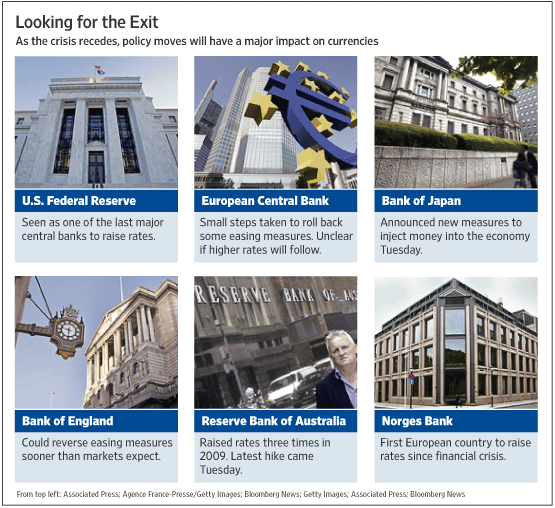December 10th 2009
Timing is Everything in Forex, Especially in this Environment
I just finished reading a Wall Street Journal piece (Central Banks Rattle Markets), which laid out, in fairly broad terms, how the activities of Central Banks have become the main fodder for forex traders, and how this trend will continue as the global economy looks to move beyond the credit crisis. The piece got me thinking about the importance of timing, when it comes to forex.
Let’s face it, timing is important when trading any security. Buying a stock one month earlier and/or selling one month later (as compared to the actual trade dates) could yield drastically different results. This is especially the case in forex, for a couple reasons. The first is that the majority of forex traders have a shorter-time horizon than investors in bread-and-butter securities. We’re talking weeks or months here, compared to years and decades. The second reason is that while long-term trends certainly exist in forex, the average return for all currencies (over a long enough time period) should converge to 0%, since forex is a zero-sum game. In other words, buy $1,000 worth of stock today, and you might be a millionaire by 2050. Buy a $1,000 worth of Euros today, however, and you will probably have about the same, give or take, 40 years later.
This notion has taken on an added significance in the current environment because of its transitional character. As I said, there are certainly long-term trends in forex, but these tend to be anything but smooth. In the short-term, then, it’s conceivable that a currency will move with little correlation to its long-term “destiny.”
We have entered a period of extreme uncertainty, specifically surrounding the actions of Central Banks. Without exception, all of these Central Banks eased monetary policy to aid their respective economies through the credit crisis. This easing varied widely from bank to bank, and ranged from interest rate cuts to “liquidity injections” to wholesale money printing. Just as the performance of many currencies has been guided by the degree of easing exacted by their respective monetary authorities, so will such currencies be guided by the degree and speed of tightening, going forward.
For example, currencies such as the Australian Dollar and Norwegian Krone (as the WSJ article pointed out) have exploded since their respective Central Banks became the world’s first two to raise interest rates. Currencies such as the Dollar and Pound, meanwhile, remain in the doldrums, as it is forecast that the Fed and the Bank of England will be among the last to reverse the spigots of easy money that they unleashed last year.
And this brings me back to the issue of timing. There will be great rewards that inure to those who correctly anticipate interest rate hikes, “liquidity withdrawals,” etc. In this age of instantaneous fund transfers, predicting a move a day before it happens could mean thousands of PIPS in profits, maybe more, if you take leverage into account. Those that think the Fed will raise rates before the ECB but after the BOE can bet on currency crosses accordingly. Moreover, it is not enough to predict who/when will hike rates, but to what extent and how fast. Maybe the Fed will beat the EU out of the starting gate, but the EU will hike faster once it gets going, mirroring what happened (in reverse) when the credit crisis began. This possibility makes you wonder if slow and steady really wins the race…
In short, the next year or two could prove to be extremely choppy (gainful for some, bitter for others) as currencies spike and dive in accordance with the Fisher Effect (the empirical idea that money moves from low-yielding currencies into higher-yielding currencies, as investors chase higher interest rates). For those that think the Dollar is doomed in the long-run, then, be careful about betting all of your marbles in the short-run. That’s not to say that the carry trade will disappear; on the contrary, it could accelerate if interest rate discrepancies widen before they shrink. Instead, consider yourself warned that if the Fed beats other Central Banks to the punch of raising rates, there could be a dramatic pause in the Dollar’s downward slide.





December 12th, 2009 at 8:59 am
[…] Archives « Timing is Everything in Forex, Especially in this Environment | Home […]